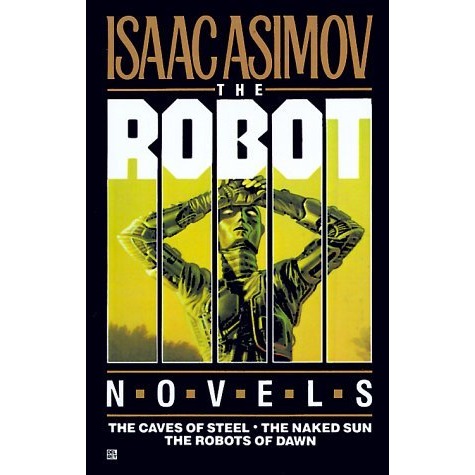Favorite Books 2015: The Robot Novels & The End of Eternity

Asimov’s longevity and prolificacy led him in a lot of directions. I enjoyed his two part history on the Roman Republic and the Roman Empire. Obviously what he’s best known for is his science fiction work from the 50’s and 60’s. The Robot Novels are quite a bit more famous than the The End of Eternity, but they do share their most important theme: a dual nature of technological advance.
Concepts
Like many others in science fiction, The End of Eternity and The Robot Novels show technology improving the lives of every day people, while also exploring the potential dangers. However, unlike other authors, Asimov doesn’t favor direct apocalyptic imagery when turning a critical eye to the march of progress. This is striking, since he was working on an era that produced works like Dr. Strange Love and A Canticle for Leibowitz. The danger of technology is not that is will lead to our destruction, but rather leave use dependent and prevent humanity from reaching it’s boundless potential.
The technology in question in The Robot Novels obviously includes robots, but also automation in a larger sense. Humanity lives is massive hive cities or on massive single person estates where all aspects of production are being increasingly automated. All farming is performed by robotic labor. And human freedom is restricted by overbearing bureaucracy.
The technology in The End of Eternity is interesting in its own right. Eternity is an organization that alters reality to keep the species from annihilating itself. But this control prevents humanity from growing in other ways.
In all three novels, Asimov’s message is that technology can become a crutch, a warm cocoon, or a safety net, that prevents us from reaching our cosmic destiny. and ultimately the risk isn’t just necessary, it is the catalyst of progress.
## Characters and Period of authorship
While the worlds depicted in the novels are convincing and compelling, the characters can be a bit bit stereotypical. The most likable character is R. Daneel Olivaw, a robot. the human protagonists are generally not particularly likeable or interesting as people.
Asimov’s depiction of women, and male attitudes towards women, in these early books are massively sexist by today’s standards. Asimov seems to be a person of his time. His later novels are easier to digest in that sense, and I have to imagine a contemporary Asimov novel would have modern characteristics. but be warned, there was a lot of eye-rolling when I read these.
Conclusion and Recommendation
Overall I would recommend these novels to people who liked Asimov’s Foundation series. If you haven’t read those. I would recommend reading the Foundation Trilogy first. The characters and social attitudes are dated, but the SF concepts are still relevant.